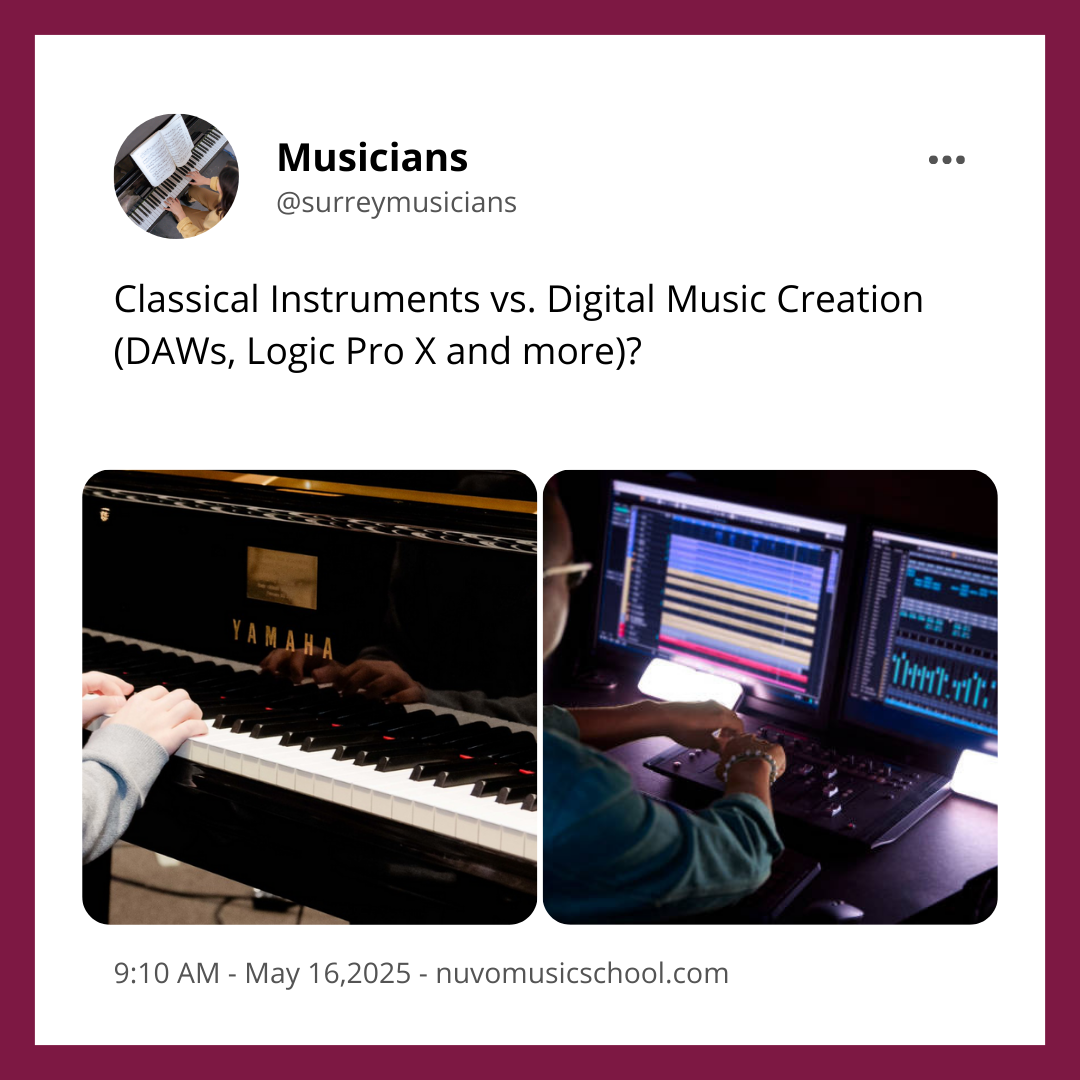Classical Instruments vs. Digital Music Creation (DAWs, Logic Pro X & more)
It's your friendly neighborhood blogger here, diving deep into something that's always fascinated me: how we make music? For centuries, it was all about mastering physical instruments and understanding complex theory. Think grand pianos, soaring violins, powerful drums, intricate guitars, and thick stacks of sheet music. But then, something shifted. The digital age arrived, bringing with it a whole new playground of sound.
This got me thinking: We often hear about the incredible cognitive benefits of learning classical instruments, especially for young minds. But what about the modern ways of making music? Does hitting 'record' on a laptop or sequencing beats on a tablet offer similar brain-boosting perks? Let's take a quick look and then chat about where these two worlds meet.
A Quick Journey Through Sound
Music, in its most basic form, has been with humanity forever. Picture ancient tribes using drums for rhythm or crafting simple flutes from bone. It was raw, immediate, and deeply human.
What we typically refer to as "classical music" really started to formalize in Europe around the year 1000 AD. It hit its golden age between the 1600s and 1800s, giving us titans like Bach, Mozart, and Beethoven – names synonymous with structure, harmony, and emotional depth. This was a world of ink on paper, live performances, and mastery of a wide range of acoustic instruments like the piano, violin, flute, cello, trumpet, and many more.
Enter the Digital Revolution
Fast forward to the late 20th century, and the way music was made got a serious upgrade. The invention of synthesizers, MIDI technology (allowing instruments and computers to talk to each other), and Digital Audio Workstations (DAWs) like Garage Band on the Mac – basically music studios in your computer- it changed the game entirely.
In this generation, you can easily compose, arrange, and produce music using these tools, with or without needing a physical instrument in sight. Started in the 2000s, powerful music creation software and hardware became accessible to pretty much anyone with a computer, or even just a tablet or smartphone. Want to make a symphony? There's an app for that! Want to build a hip-hop beat? You're just clicks away from using virtual instruments and samples.
Classical vs Digital: Two Sides of the Same Melody?
So, how do these two approaches stack up? They might seem worlds apart, but at their core, they're both about translating ideas and feelings into sound.
Classical Music Creation:
Steeped in history and tradition, following established structures and forms.
Often performed live, demanding intense skill, practice, and theoretical knowledge on a specific instrument (or voice).
Known for its deep emotional resonance and connection to centuries of culture.
Learning classical music on instruments like the piano, violin, guitar, drums, etc., is widely recognized for building discipline, patience, fine motor skills, memory, complex problem-solving (reading and playing simultaneously), and a deep understanding of musical theory. It's like building a house with a time-tested blueprint and mastering the physical tools.
Digital Music Creation (using Synths, MIDI, DAWs):
Incredibly accessible – if you have a device and software, you can start creating.
Encourages experimentation, unique sound design, and breaking traditional rules.
Perfect for modern genres like electronic, pop, hip-hop, film scores, and experimental soundscapes.
It doesn't always require traditional instrumental skill, focusing instead on understanding sound textures, rhythm programming, arrangement, production techniques, mixing, and mastering within the digital environment. It's like building a house with an infinite supply of digital materials and tools, allowing for unprecedented flexibility and experimentation.
Both approaches offer fascinating cognitive benefits. Classical training hones memory, pattern recognition, complex problem-solving, and physical coordination. Digital creation fosters creativity, experimentation, critical listening (shaping and selecting sounds), technical problem-solving, and understanding of production workflows and technology. Different skills, but equally valuable in their own ways!
My Point of View: Why Choose One?
Here’s where I land on this: Is it really about "classical instruments vs. digital tools"? Or is it simply about the diverse ways we engage in music creation?
Both the traditional methods of classical instrument mastery and the modern techniques using synthesizers, MIDI, and DAWs are powerful avenues for expression. Classical music, with its rich history and structured approach, provides an incredible foundation and deep connection to the past through physical instruments. Digital music, with its accessibility and flexibility, blows open the doors for new sounds, new genres, and allows virtually anyone to start making noise – and eventually, music!
In today's world, a young person can learn to play a Bach fugue on the piano and spend their afternoon creating original tracks using a DAW on their computer. These aren't mutually exclusive paths; they can be complementary. One teaches deep theory and physical mastery of an acoustic instrument, the other teaches sonic exploration, technical production savvy, and command over digital tools.
Ultimately, music is about connection, expression, and creativity. Whether you find your voice through the warm resonance of a violin, the percussive power of drums, or the infinite possibilities of a digital synthesizer controlled via MIDI in a DAW, the act of creation is what truly matters. It's not about picking a side; it's about exploring the vast, exciting landscape of sound available to us today, using all the incredible tools at our disposal.
What do you think? Are you a classical instrumentalist, a digital music producer, or do you dabble in both worlds?
If you are interested to learn musical instruments like piano, guitar, violin, drum, flute, clarinet (and more) we have music lessons in Langley, Surrey, White Rock, and Delta, BC that could help you. Reach us today!

